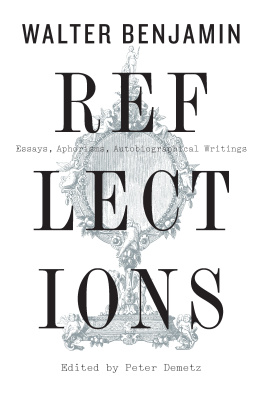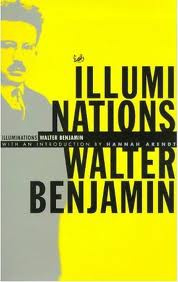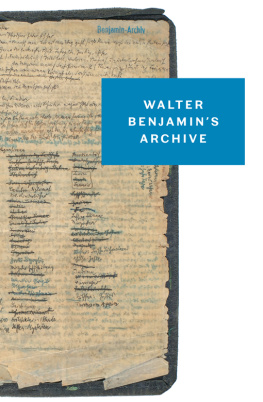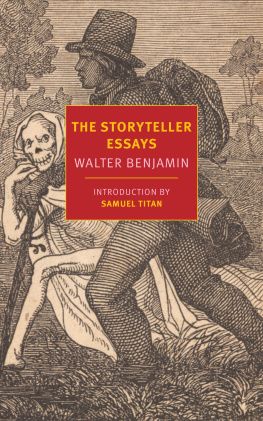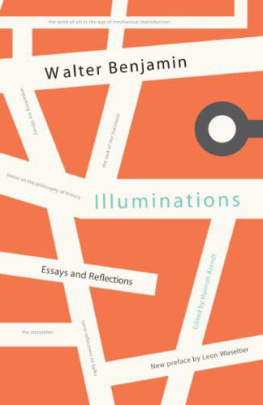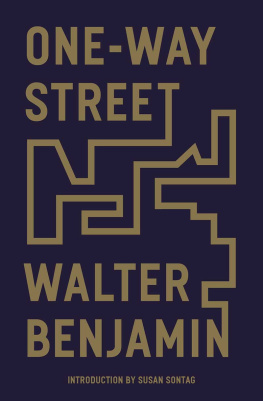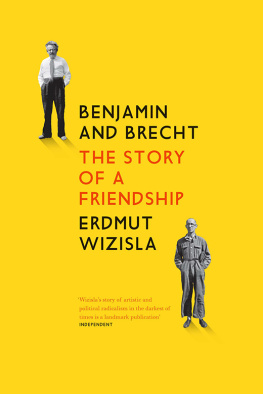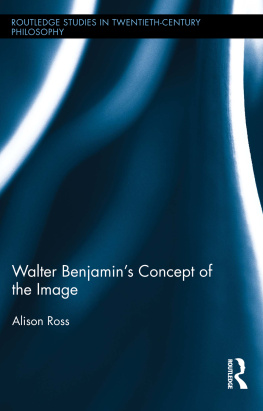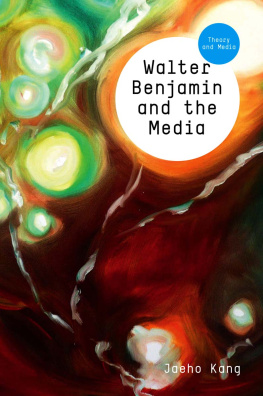First Mariner Books edition 2019
English translation copyright 1978 by Harcourt Brace Jovanovich, Inc.
All rights reserved
For information about permission to reproduce selections from this book, write to or to Permissions, Houghton Mifflin Harcourt Publishing Company, 3 Park Avenue, 19th Floor, New York, New York 10016.
hmhbooks.com
Library of Congress Cataloging-in-Publication Data is available.
ISBN 978-1-328-47022-5
Cover design by Christopher Moisan
Cover illustration iStock
e ISBN 978-0-547-71116-4
v1.0219
These essays have all been published in Germany. A Berlin Chronicle was published as Berliner Chronik, copyright 1970 by Suhrkamp Verlag; One-Way Street as Einbahnstrasse, copyright 1955 by Suhrkamp Verlag; Moscow, Marseilles, Hashish in Marseilles, and Naples as Moskau,Marseille,Haschisch in Marseille, and Neapel in Gesammelte Schriften, Band IV-1, copyright 1972 by Suhrkamp Verlag; Paris, Capital of the Nineteenth Century, Karl Kraus, and The Destructive Character as Paris, die Hauptstadt des XIX. Jahrhunderts,Karl Kraus, and Der destruktive Charakter in Illuminationen, copyright 1955 by Suhrkamp Verlag; Surrealism, On Language as Such and on the Language of Man, and On the Mimetic Faculty as Der Srrealismus,ber die Sprache berhaupt und ber die Sprache des Menschen, and ber das mimetische Vermgen in Angelus Novus, copyright 1966 by Suhrkamp Verlag; Brechts Threepenny Novel as Brechts Dreigroschenroman in Gesammelte Schriften, Band III, copyright 1972 by Suhrkamp Verlag; Conversations with Brecht and The Author as Producer as Gesprch mit Brecht and Der Autor als Produzent in Versuche ber Brecht, copyright 1966 by Suhrkamp Verlag; Critique of Violence, Fate and Character, and Theologico-Political Fragment as Zur Kritik der Gewalt,Schicksal und Charakter, and Theologisch-politisches Fragment in Schriften, Band I, copyright 1955 by Suhrkamp Verlag.
Introduction
In the mid-fifties , Theodor W. Adorno presented the first collection of Walter Benjamins essays to German audiences, and in the late sixties, Hannah Arendt prepared a similar volume for American readers. It was, both in Frankfurt (1955) and in New York (1968), a matter of rescuing Walter Benjamin from near-oblivion and of transforming what had been, in the late twenties and early thirties, a rumor among the cognoscenti into an incisive challenge to our ossifying habits of thought. Today, the situation has radically changed, and Walter Benjamin has become a new classic, at least among the members of the philosophical left on the European continent, who study his essays as avidly as those of Antonio Gramsci, Georg Lukcs, or Ernst Bloch. We now have a nearly complete edition of his collected works in which even some of his improvised reviews are preserved (as they should be) with a philological care never bestowed on Sainte-Beuve or N. G. Chernyshevski; and many groups of partisan interpreters ally their political cause, by quoting chapter and verse, with the ideas of a writer obsessed with protecting the privacy of his experience. Reading and interpreting an author have never been activities that evolve outside a complex net of committed interests and social pressures, and I cannot pretend to approach Walter Benjamin from a more impersonal view than others have done. My difficulty is that I find myself unable to share his assumptions in the traditions of Romantic metaphysics or Hegelian dialectics, but I hope to balance these serious deficiencies by a compassionate effort to understand the tragic quality of his life and the internal contradictions of his thought, which was intent, at least at times, upon a vision of history violently disrupted by the coming of the Messiah and/or the revolution of the proletariat.
Over a long period, Gershom (Gerhard) Scholem and Theodor W. Adorno collaborated loyally in editing Benjamins revealing letters and in suggesting diverse ways in which we should understand his ideas and commitments. Gershom Scholem, who was instrumental in introducing Benjamin to the Jewish spiritual tradition, continues to suggest in his memoirs that his restless friend was a religious if not a mystical thinker who may have been tempted, against the grain of his sensibilities, to superimpose the terms of Marxist discourse upon his metaphysical vision of God, language, and a society ontologically in need of salvation.
Theodor W. Adorno, Benjamins irascible friend and his first editor of substantial merit, was inclined to make some allowances for an early metaphysical infatuation that was followed, to be sure, by a more important though uneasy alliance with a critical philosophy basically incarnated in the work of the Frankfurt Institut fur Sozialforschung, which was continued, after Hitler had come to power, in Geneva and New York. In his own sophisticated way, Fredric Jameson, in one of the first important essays on Benjamin published in this country, fully supports Adornos claims and adds a dash of inevitable melancholy characteristic of American academic Marxists in their frustrating search for an old-fashioned proletariat. Yet the neat division between a metaphysical and a materialist reading of Benjamin, advanced by Scholem and the critical Marxists respectively, has been modified more recently by the German critic Helmut Heissenbttel and some younger interpreters emerging from the radical German student movement of the late sixties, who rightly stress the substantial differences between Adornos and Benjamins way of using Marxist ideas. These critics say, with a good deal of justification, that we cannot entirely understand Benjamins particular brand of Marxism without looking more closely at his creative friendship with the playwright Bertolt Brecht, a relationship very little appreciated by either Scholem or Adorno. Scholems religious views thus compete with a rich array of highly differentiated Marxist readings of Benjamin, and yet I prefer a third way, suggested by Martin Jays sober history of the Frankfurt Institut, Hannah Arendts biographical essays concerning the paradoxes of Benjamins personality, and Ren Welleks judicious panorama of his critical views. I am less concerned with constructing a systematic pigeonhole than with sketching a biographical account of Benjamins experiences against crucial years of Central European history and with trying to ease, if it can be done at all, the exhilarating difficulties of reading some of his best writings, which are totally alien to the pragmatic and analytic orientations long prevalent in American thought.
In many Jewish families of late nineteenth-century Europe, gifted sons turned against the commercial interests of their fathers, who were largely assimilated (after moving from the provinces to the more liberal cities) to bourgeois success, and, in building their counterworlds in spiritual protest, they incisively shaped the future of science, philosophy, and literature. Articulating an insight of far-reaching implications, Karl Kraus, the belligerent Viennese satirist, suggested in his Magical Operetta (much enjoyed by Benjamin) that little Jewish family dramas were being played all over, the stern fathers concerned with tachlesprofitable business ploysand the spiritual sons with shmonzesthe less profitable matters of the pure mind. Whether we think of Sigmund Freud, Edmund Husserl, or Franz Kafka, we need few modifications to apply this description to what happened in these families, and in the story of Benjamins development, the fundamental pattern reasserts itself with particular clarity. Walter Benjamins parents belonged to the Berlin Jewish upper-middle class, and his childhood was protected by an elegant household of refined

